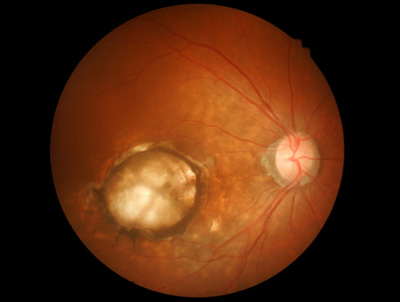Study finds levodopa delays onset of macular degeneration
Posted: 11 November 2015 | Victoria White
Scientists found that patients who began taking levodopa before they developed macular degeneration were diagnosed with the eye disease eight years later than those who had never taken the treatment…

A University of Arizona-led study has found that patients who take levodopa, a common treatment for Parkinson’s disease, appear far less likely to develop macular degeneration.
And if they do develop the disease, it is significantly later in life.
Levodopa is a naturally occurring molecule that is made in pigmented human tissue, including the iris of the eye, and has a role in maintaining healthy macula, the part of the retina that provides the most visual acuity. A synthesized form of levodopa is used to treat Parkinson’s and movement disorders.
The study was led by Brian S. McKay, associate professor of ophthalmology and vision science and celleular and molecular medicine at the UA College of Medicine. Dr McKay commented, “It is likely that this will lead to a way to prevent age-related macular degeneration (AMD), and it may also lead to treatment for macular degeneration in the future. It may also help with other eye diseases characterised by retinal degeneration, such as retinitis pigmentosa.”
“Research points to this as a pathway to regulate and prevent this most common cause of blindness in adults,” said Murray Brilliant, director of the Marshfield Clinic Research Foundation Centre for Human Genetics in Marshfield, Wisconsin. “Imagine telling patients we potentially have medication that will allow them to see and continue enjoying life, their family and perform every day activities as they age. That is very powerful.”
Dr Paul A. Sieving, director of the National Eye Institute, a branch of the National Institutes of Health, said the research “suggests an intriguing link between patients taking levodopa and a lower incidence and delayed onset of AMD. Showing that levodopa causes this protective effect will require further investigation, but if confirmed, could lead to new drugs or combination therapies for AMD that target dopa-responsive cells in the retina.”
McKay pursued this research after he discovered that the support tissue for the retina expressed a receptor for levodopa, and that this signalling pathway fostered retinal survival. He and Brilliant hypothesised that those taking levodopa may be protected from AMD.
Levodopa both prevented and delayed the “wet” form of AMD
To answer this question they analysed the health records of 37,000 Marshfield Clinic patients to determine who had macular degeneration, who took levodopa, or both. Brilliant found that patients who began taking levodopa before they developed macular degeneration were diagnosed with the eye disease eight years later than those who had never taken levodopa. They also noted that there were many fewer AMD patients in the group that were prescribed levodopa.
The next phase of the research involved analysis of a much larger, insurance-industry database of medical records on 87 million patients. The same connection between levodopa and macular degeneration held. Further, with this enormous dataset, they were able to show that levodopa both prevented and delayed the “wet” form of AMD, which is far less common than “dry” AMD but is responsible for about 90% of AMD-caused blindness.
A clinical trial to further validate these research findings will be the next step of the research.
Related organisations
University of Arizona


